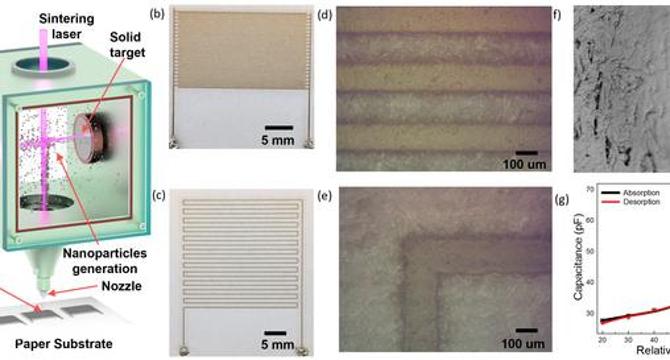Bioengineer
3d
39

Image Credit: Bioengineer
Revolutionizing Global Food Supply: The Critical Role of Eco-Friendly Sensors
- Researchers at Auburn University have developed eco-friendly sensors aimed at revolutionizing greenhouse management and food storage practices, by employing cellulose fibers as a medium for sensor construction
- Dry additive nanomanufacturing, allows for precise control over the production of these sensors that print silver lines onto biodegradable paper substrates, ensuring that the sensors retain their effectiveness in monitoring crucial parameters in agricultural environments.
- As these sensors engage with moisture in the air, they exhibit changes in capacitance, which corresponds directly to shifts in humidity levels. The temperature-sensing mechanism integrated into these sensors functions through alterations in resistance, allowing for continuous monitoring.
- The sensors developed by the research team have demonstrated impressive sensitivity across a range of humidity levels, accurately detecting changes from a relative humidity of 20% to 90%. Their temperature monitoring capability spans from 25°C to 50°C, rendering them suitable for a variety of agricultural climates.
- One of the greatest advantages of these biodegradable sensors is not only their effectiveness but also their cost-efficiency, opening the door for broader adoption and supporting sustainable practices across diverse agricultural settings.
- Once their lifecycle is complete, these sensors offer a safe disposal solution as they are biodegradable. The ability to recycle agricultural technology aligned with environmental stewardship represents a significant advancement in sustainability within the agricultural sector.
- The work being done at Auburn University exemplifies how the merger of science and industry can yield groundbreaking results that cater to the pressing demands of modern agriculture while upholding our commitment to the planet.
- As the need for innovative agricultural technologies grows, the integration of eco-friendly materials and advanced manufacturing processes will be critical in shaping future practices.
- The research team's contribution to the scientific community inspires agricultural practitioners to rethink their technology choices, reflecting a collective responsibility to advance agricultural technology that minimizes negative ecological footprints while maximizing productivity.
- This innovation addresses not only the immediate needs of farmers but also the long-term ramifications of agricultural waste, offering the potential to shape the future of food production, directly influencing practices in smart farming.
Read Full Article
2 Likes
For uninterrupted reading, download the app